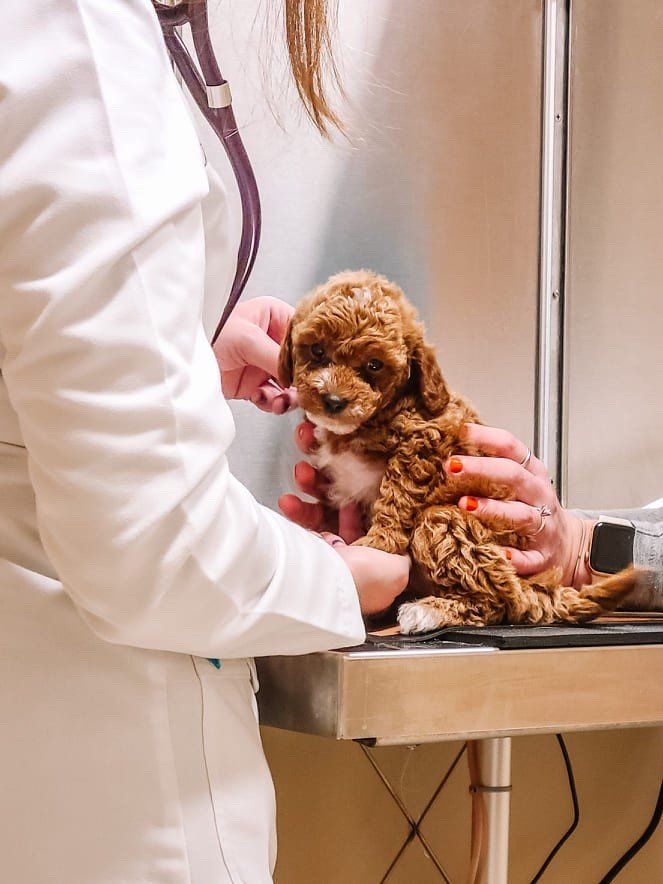Heartworm Prevention
Homemade Puppies, LLC strives to be your trusted source for not only connecting with your new fur-baby, but also answering the dog related questions you may have to enhance your experience with your dog/puppy. Each week our in house dog expert, Katie, answers your puppy and dog questions. Submit your canine questions to info@homemadepuppies.com.
As always puppies advertised on Homemade Puppies are always 100% raised in-home by responsible family breeders...never raised outside or in a barn, etc. No Puppy Mills, ever. We promise. www.homemadepuppies.com
Here is this week's blog from Katie!
Heartworms are parasites that are injected into the bloodstream through a mosquito bite. The parasites travel and make a home in the heart or lungs of the infected dog. The dog is a natural host for heartworms, meaning they mature into adults, mate and produce offspring in the dog's bloodstream. If untreated their numbers can increase. Mosquitos act as the parasite-transmitting agent between a heathy dog and an infected dog. By harming the vital organs, heartworms can be deadly if left untreated.
Heartworms also live in other mammals such as cats, ferrets, coyotes, wolves and in very rare cases, humans.
In early stages of the disease dogs might show very mild symptoms or no symptoms at all. The longer the infection persists, the more likely symptoms will develop. Symptoms may include: a mild persistent cough, reluctance to exercise, fatigue after moderate activity, decreased appetite, and weight loss. Advance stages of the disease cause heart failure and the appearance of a swollen belly due to excess of fluid in the abdomen.
Heartworm is seen in all 50 of the United States. The warmer states, where the mosquito population is active all year long, have the highest cases of heartworm disease. However, with the trend of bringing pets from the southern shelters to the north to be adopted, heartworm cases are increasing all over the country. This was seen following Hurricane Katrina when 250,000 pets were shipped throughout the US to be adopted, many of whom were infected with heartworm disease. Families who travel with their pets may unknowingly take their dog to an area where heartworm disease is prevalent. Because mosquitoes come inside, both indoor and outdoor pets are at risk.
HEARTWORM PREVENTION
Heartworm prevention comes in a couple forms.
There are oral medications, topical medications or injectable medication. Most heartworm medication is given once a month. It can usually be started in puppies as young as 8-12 weeks old. Follow your veterinarian's guidance on what heartworm prevention is best for your pet.
Generally puppies under 7 months of age can be started on heartworm prevention without being tested first. It takes at least 6 months for a dog to test positive after it has been infected. Adult dogs over 7 months of age who have not been on prevention, should have a blood test done before starting heartworm prevention. They should also be tested 6-12 months after starting prevention. Yearly heartworm tests are a good idea even for dogs that have been on monthly prevention. When prevention is purchased from a veterinarian, the manufacturer of the medication will guarantee their product and pay for treatment if a heartworm infection occurs. Heartworm medication is only licensed to be sold by a veterinarian. It cannot be purchased over the counter. The earlier heartworm disease is detected the more successful treatment can be. Since there are few, if any, signs of early infection, testing with a blood test is necessary and important. Usually a heartworm test can be run in your veterinarian clinic and results can be obtained in as few as 5 minutes.
No one wants to think that their dogs could be infected with heartworms. If you suspect that maybe your dog has heartworm disease contact your veterinarian to get tested. If the test is positive, your veterinarian will discuss a treatment plan. In many cases treatment is very successful. During treatment you will have to restrict exercise for your dog. Physical exertion increases the rate with which heartworms cause damage in the heart and lungs.
Talk to your vet today about heartworm prevention for your puppy or dog!
Do you have a question for Katie? Submit your question(s) to info@homemadepuppies.com.
Looking for a puppy? We have a large variety of puppies from pure-bred to mixed breed and large to small. Check out the in-home raised puppies we offer at www.homemadepuppies.com. The puppy's information such as location, description, price, breeder's contact information will be listed on the puppy's page. As always puppies advertised on Homemade Puppies are always 100% raised in-home...never a kennel or barn, etc. No Puppy Mills, ever. We promise.
Do you have a litter of in-home raised puppies that you would like to advertise on www.homemadepuppies.com? Email info@homemadepuppies.com for more information on how to get started!
Don't forget to catch Katie's blog from last week: https://www.homemadepuppies.com/what-you-need-to-know-about-puppy-vaccines










